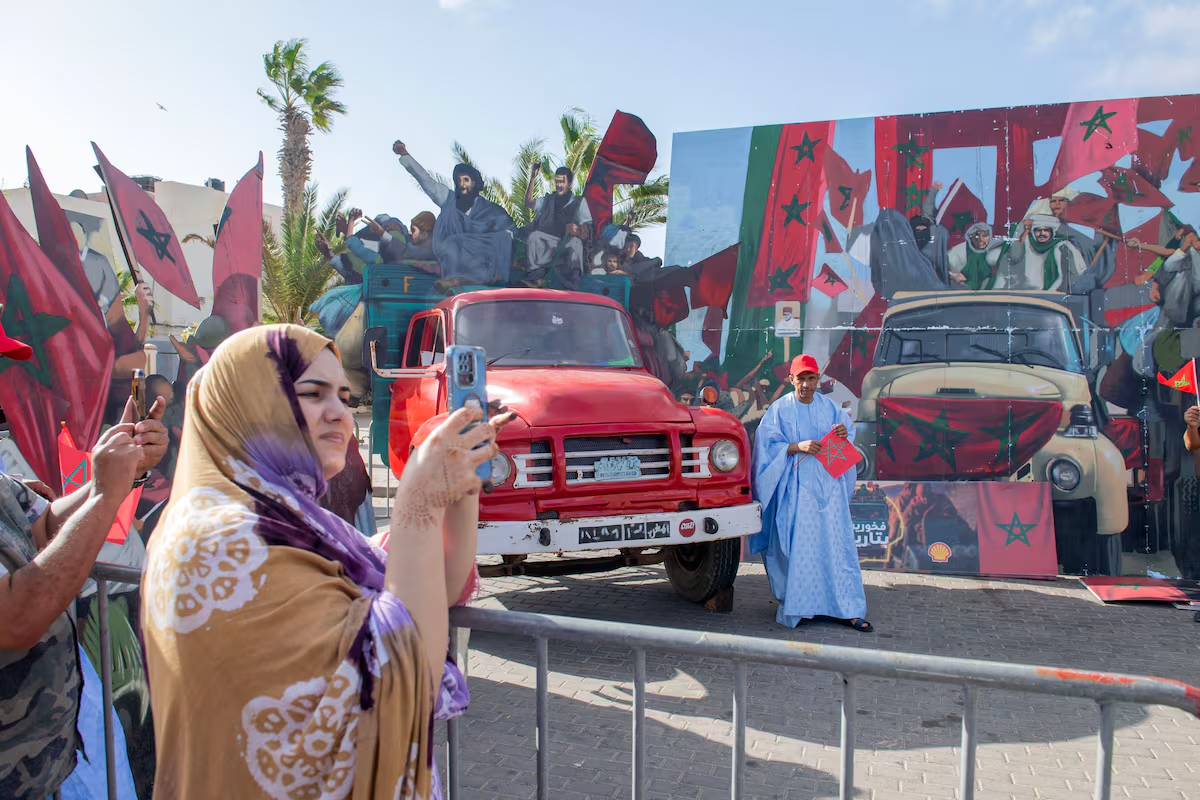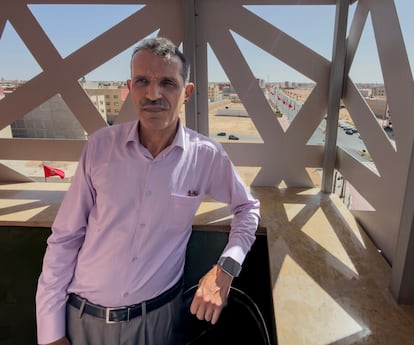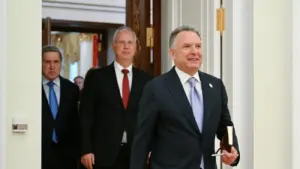
Morocco preferred to remember without exaggeration the fiftieth anniversary of the Green March, the massive human mobilization with which it forced Spain to leave Western Sahara, its last African colony. A week after the UN Security Council approved, without any dissenting votes, a resolution establishing Rabat’s autonomy plan as the basis for resolving the territorial conflict, King Mohamed VI chose to cancel his traditional speech at the Green March festival, held this Thursday. He also traveled to the United Arab Emirates instead of presiding over commemorative ceremonies in Laayoune, as he did 10 years ago on the 40th anniversary.
In El Aaiún, the capital of the Sahara, the festive atmosphere was evident this Thursday in the central Mechuar square (home of the official Moroccan centres), with entire families crowded before musical performances and historical reenactments among closed shops. Meanwhile, activity seemed like any other weekday in Sahrawi nationalist neighborhoods such as Casa Piedra and Colominas, which emerged under Spanish colonial administration amid a stepped-up deployment of security forces.
Only a few ministers have participated in the commemorative ceremonies in El Aaiún in recent days. The king of Morocco has established that October 31, the date of the vote in favor of his country’s interests at the UN, will be the new national holiday of Unity. Incidentally, he decided to suppress the Green March speech, in which he annually commemorated the decision of his father, Hassan II, to advance more than 350,000 Moroccans towards the Sahrawi frontier defended by the Spanish army on November 6, 1975. Eight days later, an agreement signed in Madrid ended the Spanish colonial presence in the Sahara.
Currently, 80% of the territory is under the control of Rabat. The remaining 20% is in the hands of the Polisario Front, which from exile in Algeria defends the independence of the territory through self-determination.
Amid a sea of red and green pennants and flags, the Moroccan national flag and portraits of King Mohamed VI in the Saharan capital, the main attraction of the fiftieth anniversary appears to have been the symbolic recreation of the Green March, where citizens took photographs in front of the old British Bedford trucks used to transport the 1975 mobilization. These same vehicles continue to transport water tankers to the municipal reservoirs of El Aaiún today.
At night, reconstruction of the Green March, accompanied by a drone show and titled Nostalgiadesigned to bring together thousands of people in the city centre.
Unionist sectors
Of the openly unionist sectors, in favor of annexation pure and simple to Morocco, the mayor of El Aaiún, Hamdi Uld Errachid, assured that “the latest resolution of the Security Council definitively resolves the Sahara conflict and establishes that Moroccan sovereignty is indisputable” in the statements collected by Cadena SER. The tribal leader of the Ergueibat, the largest nomadic group in Western Sahara, Errachid, 78, claims that those calling for self-determination “are not from the Sahara”.
The president of the municipal administration also asked Spain to follow the example of other countries and open a consulate in his city, as well as approve investments in the territory of his former colony.
The pro-Moroccan Sahrawi authorities of El Aaiún assure that they are extending their hand to the exiles of Tindouf (southwest of Algeria) to return to the Sahara, where over 80% of the current population has arrived from Morocco in the last 50 years. From underground, supporters of Saharan independence and sympathizers of the Polisario Front are wondering whether the recent Security Council resolution will put an end to the right to self-determination.
“Legitimate fight”
“As long as the Moroccan occupation continues, which deprives the Sahrawi people of the right to self-determination and sovereignty over their own resources, the Sahrawi people will continue their legitimate struggle,” said Ali Salem Tamek, president of the human rights organization Codesa, quoted by the Efe agency. The same source insists on the fact that “the only legitimate representative” of the Sahrawis remains the Polisario Front.
In recent years, Rabat’s investments in Western Sahara have exceeded 8 billion euros. This resulted in rapid population and urban expansion in Laayoune. From the roof of a hotel on the Smara highway, where the new hospital under construction, the Faculty of Medicine and other educational centers are located, the city’s growth seems to have no end, as new works are undertaken, such as a new bridge on the north-south axis of the Sahara.

With this horizon, the Saharawi Larbi Enas, 60 years old, proposes a third way. He was military head of the Polisario before returning to El Aaiún after the ceasefire with Morocco in 1991. Founder of the Sahrawi Movement for Peace, an autonomist organization from which he has already dissociated himself, he currently directs the Center for Peace for Political and Strategic Studies. “As a civil society, I believe that self-determination is now a utopia. We were nomads and we never had a state”, he maintains. He believes Morocco’s 2007 autonomy plan can be a starting point, but believes the proposal “must evolve.”
“Morocco must reform its Constitution to recognize the historical autonomy of the Sahara,” he warns. “In the meantime, reality shows are changing,” he points out the new neighborhoods from the hotel roof. “The city that the Spanish left in 1975 after the Green March now has a population 10 times larger, of about 500,000,” he says.
The UN special envoy for Western Sahara, Staffan de Mistura, now awaits proposals from the parties to develop a “broad agenda of negotiations” based on Morocco’s autonomy plan. In statements to the press on Wednesday, the UN mediator warned that “work to reach a mutually consensual solution now begins.”
De Mistura, an expert in complex UN missions such as the one in Syria, also underlines that the recent Security Council resolution “provides a framework for negotiations”, but “does not automatically prescribe a result”. “Only consensus serves to respect the principle of self-determination,” concludes the diplomat who must direct the negotiations on Western Sahara.







